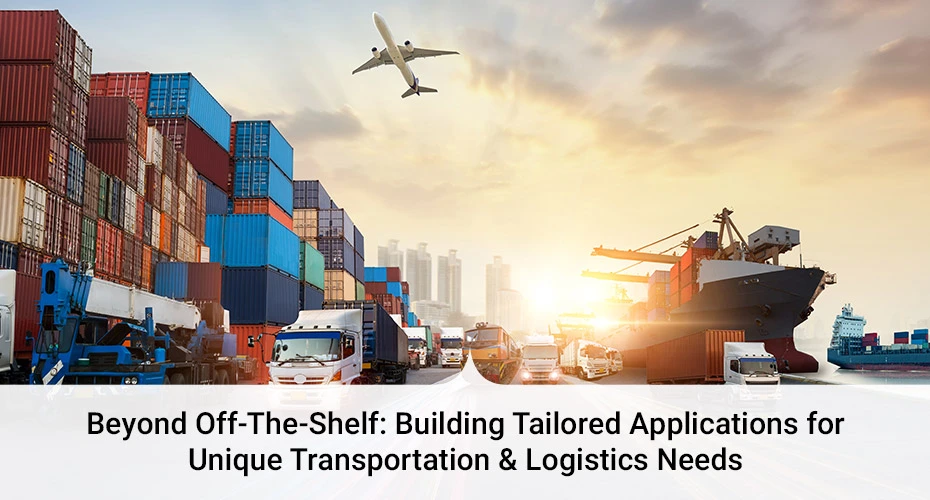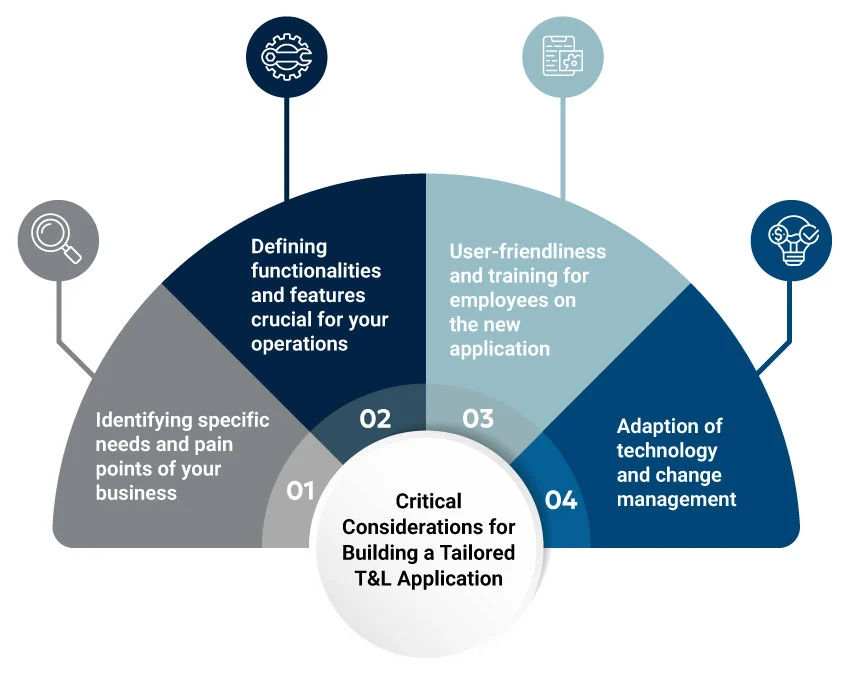

June 10, 2024 - by Parth Jani
According to Global Market Insights, the global custom software development market is projected to soar to $198.6 billion by 2032, exhibiting a CAGR of 21.5%. This trend resonates strongly within the logistics domain, as forward-thinking organizations increasingly recognize the limitations of one-size-fits-all solutions. Our first blog examined how the transportation and logistics sector is leveraging digital transformation to achieve scalability and facilitate expansion. In the second part of our three-part series, we delve into how custom applications can enhance your digital transformation initiatives within the industry.

While off-the-shelf solutions may seem convenient, they often fail to address the unique challenges and complexities businesses face in the transportation and logistics industry.
Transportation and logistics companies often have unique processes and workflows customized according to their operations, resources, and client needs. Off-the-shelf solutions are designed to be generic, catering to a broad range of businesses. As a result, they may not align perfectly with a company’s existing workflows. Attempting to force a one-size-fits-all solution onto a company’s unique processes can result in disruptions, increased training costs, and resistance from employees accustomed to their usual operating methods.
A customer was looking for a custom process where the receipt of the Proof of Delivery (POD) document automatically marks the shipment delivered with a verbal POD addition. This is not a standard business practice so that no ready-made TMS can support this.
Most transportation and logistics companies have already invested in various systems and technologies to support their operations, such as enterprise resource planning (ERP) systems, warehouse management systems (WMS), and transportation management systems (TMS). Off-the-shelf solutions may not be designed to seamlessly integrate with these existing systems, resulting in data silos, manual data entry, and a lack of real-time visibility across the organization.
We worked with a customer who intended to upload a POD to a customer’s digital solution using a specific file name format with a file name length and document size restrictions. Imagine trying to solve this situation through an off-the-shelf product.
Transportation and logistics companies often have unique operational requirements and customer-specific demands beyond the standard features offered by off-the-shelf solutions.
A customer requested that each in-transit shipment should at least have a tracking update (check call) entered every two hours. If the updates are unavailable every two hours, the customer should be notified immediately, considering the value of the shipment. Similarly, there are several other nuances of the shipment order to cash life cycle where an operational request and customer experience take precedence and demand a business process tweak to fulfill the business demand. These specific transportation needs are expensive to build with off-the-shelf platforms.
Transportation and logistics operations involve exchanging sensitive information, such as customer data, shipment details, and financial information. Third-party vendors often develop off-the-shelf solutions, and companies may have limited control over the security measures implemented within these solutions. This lack of control can raise concerns about data privacy, vulnerability to cyber threats, and compliance with industry regulations and data protection .
A large pharmaceutical company was considering an off-the-shelf TMS for managing its temperature-sensitive drug shipments. However, they hesitated because the software stored shipment data, including patient information and exact drug compositions, on the vendor’s cloud servers. The company was concerned that a data breach at the vendor’s end could expose confidential patient data and proprietary drug formulas. They ultimately chose a custom solution that allowed data to be stored on their own highly secured servers.
In contrast to off-the-shelf solutions, tailored applications offer a compelling solution to address the unique challenges faced by transportation and logistics companies.
Tailored applications are designed to align with a company’s specific workflows and processes, eliminating the need for workarounds or compromises. By understanding the intricacies of a business’s operations, tailored solutions can automate repetitive tasks, streamline data entry, and optimize decision-making processes. This streamlining frees up valuable time for employees to focus on more strategic and value-adding activities.
One critical advantage of tailored applications is providing real-time visibility into shipment locations, status updates, and delivery timelines by tailoring specific tracking workflows followed by the organization. Tailored solutions can offer comprehensive and accurate shipment monitoring capabilities by integrating various tracking systems and leveraging technologies like ELD, Mobile Phones, GPS, and RFID. This level of visibility enables proactive decision-making, efficient resource allocation, and enhanced customer service through timely updates and notifications. A concept like a full visibility control tower, which acts like a tracking board for the organization, may help the tracking teams focus on just those shipments that need attention, improving overall efficiency.
Tailored applications are designed to seamlessly integrate with a company’s existing infrastructure, including their ERP systems, WMS, and TMS. This creates a unified data stream, eliminating the need for error-prone manual entry. With seamless integration, companies can leverage their existing investments while benefiting from the enhanced capabilities of a tailored solution. Unified data visibility through a custom platform can help organizations have complete visibility and understanding of the state of the shipment business lifecycle and customer journey.
As businesses in the transportation and logistics industry grow and evolve, their technology needs may change accordingly. Tailored applications are built with scalability, allowing companies to adapt and expand their solutions as their operations grow or new requirements emerge. This flexibility ensures that the investment in a tailored solution remains relevant and valuable over the long term, providing a future-proof foundation for continued success.
Data security is a paramount concern in the transportation and logistics industry. By building tailored applications, companies have complete control over the security measures implemented, ensuring compliance with industry regulations and data protection laws. Tailored solutions can ensure robust security features, providing peace of mind and minimizing the risks associated with data breaches or unauthorized access.
While the benefits of tailored applications are evident, building such a solution requires careful business assessment, consideration, and planning.

Before building a tailored application, it is crucial to thoroughly identify and understand your business’s particular needs and pain points.
This involves comprehensively assessing your current processes, workflows, and operational challenges. Engaging with stakeholders across different departments, such as operations, logistics, customer service, and IT, can provide valuable insights into the areas that require improvement or optimization. Clearly defining these needs ensures the tailored application addresses the correct problems and delivers tangible value.
Once you have identified your specific needs and pain points, the next step is to define the functionalities and features the tailored application should possess.
For example, if real-time shipment tracking is a key priority, the application should incorporate advanced GPS tracking and integration with telematics systems. Defining these functionalities and features will ensure the application aligns with your operational requirements and delivers the desired outcomes.
A powerful app is only as good as its users. Providing comprehensive training and support for your employees is essential to ensure that they can fully leverage the capabilities of the new application.
This training should cover not only the technical aspects of the application but also the underlying processes and best practices. By prioritizing user-friendliness and training, you can maximize the return on investment and ensure that the tailored application delivers its intended benefits.
Adopting new technology can be a game-changer for any industry, but it often comes with specific adoption and change management challenges. Custom platform development helps businesses tailor solutions to their needs, making the transition smoother and more effective. With a custom platform, companies can integrate new technology seamlessly into their existing processes, reducing the disruption often accompanying change. Effective change management strategies also ensure that employees are supported throughout the transition, fostering a culture of adaptability and continuous improvement. This approach boosts productivity and ensures the organization can quickly respond to market changes and emerging opportunities.
Choosing the right development partner is the key to a successful tailored transportation and logistics application. At Synoptek, our in-depth logistics knowledge allows us to bridge the gap between your specific needs and a robust, scalable technology solution.
In the third and final part of the blog series, we will explore how these modernized applications can enhance the shipper experience and improve visibility within the transportation and logistics industry.
Leverage our custom software development services to optimize your logistics operations today!
Parth Jani is a Principal Consultant with over 13 years of industry experience and brings a comprehensive skill set spanning technology and business domains. With a proven track record in presales, project execution, and product management, Parth transforms ideas into valuable solutions via business analysis and solution architecting. He has led numerous transportation and logistics projects, demonstrating deep sector knowledge. His strategic thinking and attention to operational details enable him to drive success throughout the business lifecycle while fostering team growth and collaborating closely with executives to enhance business performance.